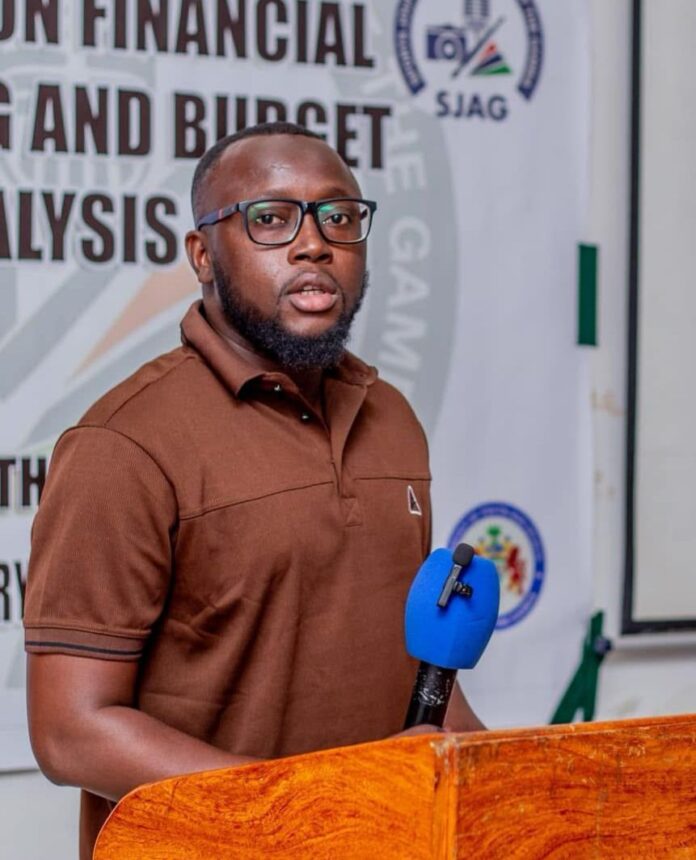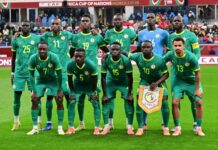By Muhammed Lamin Drammeh
“His sweet talk wove a spell around me with promises of marriage that crumbled when I discovered his two wives. Pregnant and abandoned, I watched him unravel, not just from my life but from the web of lies he had spun. Once a student with dreams that burned bright, I’m now cast out of school, my future a flickering ember. The excuses I crafted for my parents to preserve their image of me as their pure and untarnished girl dissolved against the weight of their knowing. He texted me to meet at his rented house, a snare I stepped into blindly; now his silence traps him in a prison of his own making, one he’ll never escape.”
Bintaa had once been a vision in her crisp school uniform, tall and fair-skinned. Her elegance was a quiet flame amid the chaos of teenage chatter. Her full lips parted in a shy smile, with small ears catching the light and silver rings nestled beneath her dark hair. Slim yet strong, she moved with a grace that seemed effortless, a blue bag scrawled with “miss” in red slung over one shoulder, or a white one fit for a bride cradled in her arms. Her brown eyes shimmered with ambition, her teeth flashing white against her sharp, dark jawline – a proud mark of her Fulani roots.
Binta was raised in a home where faith and honor were the mortar binding every brick. As the eldest child of Yafatou and Pa Lamin, she lived under their unyielding rules: returning home after school, chanting prayers at dusk, attending evening dara lessons by lamplight, and upholding the family’s dignity above all else. Yafatou pictured the night Bintaa would be draped in white, handed to a husband as a jewel of tradition, while Pa Lamin swelled with pride over her virtue, his voice booming her praises to neighbors. In her early secondary years, Bintaa embodied the dreams her parents had for her. She was their triumph: earning top marks, displaying flawless conduct, and serving as a beacon for teachers and a mirror for peers. Parents in their community would urge their daughters to emulate her as a model.
At school, her beauty drew stares, but Bintaa kept her eyes on her books and her dreams a ladder to hoist her family higher. In her final year, with exams looming like a gateway to glory, Sulayman Touray slithered into her orbit. A handsome English teacher in his mid-thirties, he camouflaged cunning with charm. Known as the “Gambian Shakespeare” for his mastery of language and literature, Sulayman, at thirty-four, juggled two wives and four children across separate homes. Yet two wives never sated him. Teaching was his stage, seduction his script, and luring students to his bed had become a game he played with impunity.
To Sulayman, women were vessels: pliable, predictable, meant to bend to his will. He saw them as extensions of his power, their beauty a currency he could claim, and their trust a weakness he could exploit. His mother had been a shadow to his father’s thunder, his sisters hushed echoes in their husbands’ compounds. In his classroom, he reigned as a king, students his pawns, and their innocence his battlefield. Bintaa, radiant and ripe with potential, unfortunately, became his next conquest.
It began with flattery. “You’re a star, Bintaa,” he’d purr, his voice smooth as the Sanyang beach. Bintaa would blush, and her heart would quicken under the spotlight of his praise. Sulayman fed on that flush, a predator savoring the scent of prey. He offered free extra lessons for grade 12 students gearing up for the West African Senior Secondary School Certificate Examination. He would scribble his number on the board with a casual, “Call anytime.” Bintaa, starved for success, bit the hook, blind to the trap beneath.
Their first meeting unfolded in the school’s cluttered library, desks crooked and air thick with chalk dust. After a quick exchange of words, Sulayman invited her to his rented house for “extended lessons.” The next day, Bintaaa lied to her parents about staying late for class, her voice steady despite the tremor in her chest. Her peers shrugged off his offer, some wary, others indifferent, leaving Bintaa to hunt her grades solitary. At his house, a shabby den shared with colleagues and funded as a lure for women, he told her. “Has anyone told you you’re the prettiest girl here?” he murmured, leaning close, his breath warm against her ear. “No, sir,” Bintaaa stammered, heat rising to her cheeks.
Sulayman played her like a fiddle, blending commendation with promises. One afternoon, as the school emptied under a blazing sun, he texted Bintaa: “Meet me at the house.”
She arrived expecting lessons, her books clutched tight, but he greeted her half-dressed, gesturing inside with a lazy grin. “Make yourself at home—this is your place now,” he said, stepping away under the guise of dressing. He returned moments later, sitting too close and his eyes tracing her like a map. “You’re special,” he whispered. “Imagine a life with me as your husband.” Bintaa froze, flattered yet uneasy, her mind a tangle of hope and doubt. His hands roamed on her breast, her ears—his touch a tide that swept away her defenses. That day, behind the pretense of lessons, their secret took root, shattering the bright arc of her future. Sulayman, tethered to two wives, stripped her pride bare. She wept, but his “I’ll marry you” hushed her tears, a lie she clung to like driftwood in a storm.
At first, it felt like a lifeline. Bintaa trusted him, swept into his vows like a moth to flame. Their clandestine meetings became a pulse stolen hours in his dimly lit den and his whispers a balm to her guilt. She’d rush home before dusk, masking her shame with forced smiles, clutching a future he’d never deliver. Inside, a war raged: the girl who’d memorized Quranic verses at night and honored rules battled the one who now craved his touch. “What am I becoming?” she’d wonder, gazing at her reflection in a mirror above her bed. “This isn’t me—but what if it is?” The conflict chewed at her faith screamed betrayal, yet his words painted a dream she couldn’t unsee.
Six weeks later, sickness seized her: nausea twisting her mornings and weariness sinking into her bones. Too weak for school one day, she staggered home, her uniform clinging to her sweat-damp skin. Her parents, ever watchful, rushed her to the clinic after she retched into a basin. The doctor probed her symptoms: fatigue, fever, nausea—then paused. “When was your last period?” Her father Pa Lamin’s jaw tightened. “Is that necessary, doctor? She’s eighteen, still a child!” The doctor pressed for a test, and Pa agreed. Two minutes later, the truth crashed down: “She’s pregnant,” the doctor said, holding a test result in his hands. Her mother Yafatou gasped in shock, crumpling into a chair, and tears blazing her face. Pa Lamin turned to pebble, his eyes molten with rage.
“How could you, Bintaa?” Yafatou sobbed, hands trembling. “We gave you everything—love, faith, a path!” Her vision of a pure daughter ravaged like glass. Pa Lamin, who’d trumpeted her virtue, felt a betrayal knife through him. “Who?” he growled, voice rough as gravel. Bintaa faltered, fear choking her, but his glare pried it loose. “Mr. Jallow,” she whispered, “our English teacher.”
Pa Lamin demanded Jallow’s whereabouts. When he learned, he stormed to the house, Yafatou trailing, her wails slicing the air. They confronted him, fists pounding on his door. “I never promised marriage,” Jallow said coolly, arms crossed, his voice as flat as a dagger. “It was mutual. I’ll pay for the child—that’s it.” Pa Lamin’s fists clenched. “You preyed on her!” he roared. Jallow shrugged, unrepentant. “I never forced her—she came willingly,” he lied, his smirk a taunt.
Bintaa’s family wouldn’t end the pregnancy because faith forbade it.
“After all our praise, you brought this humiliation,” Pa Lamin sounded, his voice breaking. “Seven generations could feel this. Why trust him?” He turned away, unable to meet her eyes. Yafatou’s tears hardened into a brittle resolve, though the wound bled on.
Quickly, gossip blazed through the village. The community branded Bintaa “a wolf in sheep’s clothing.” Her classroom seat grew cold, her bags gathered dust, and her shoes stilled by the door. Friends drifted away, their pity sharper than scorn. But Jallow’s reckoning brewed.
Whispers reached his wives, Mariama and Hawa. Mariama, fierce and weary from his neglect, unearthed his trail of deceit, piling up like bones. Furious, she rallied Hawa, the second wife. One evening, they stormed his hideout, voices like thunder, dragging out evidence in texts. Students caught wind, and outrage swelled. Parents besieged the school, and Jallow was sacked, his career reduced to ash. His wives divorced him and demanded his assets. But the reckoning didn’t end there.
The community, once dazzled by his charm, turned with a vengeance. A group of fathers, led by Pa Lamin, lodged a formal complaint with the local authorities, their voices hoarse with rage as they recounted Sulayman’s predation not just on Bintaa but on others whose stories now surfaced like ghosts from the shadows. The police, pressured by the swelling crowd outside their station, hauled Sulayman in. He sat in a cramped, sweat-soaked cell, his usual swagger replaced by a scowl, as they pieced together testimonies: three other girls, lured and discarded over the years, and their families too embarrassed to speak until now.
The law moved slowly, but it moved. He was then taken to court. At the court hearing, the air thick with dust and anger, Sulayman stood defiant, his arms crossed, and claimed consent as his shield. But the evidence of texts promising marriage and witnesses to his coercion painted a predator, not a teacher. The magistrate, a stern woman with gray-streaked hair, sentenced him to seven years in prison for abuse of authority and statutory violations. “You preyed on trust,” the magistrate said, her voice cutting through his protests. “This ends here.”
Shackled and led away, Sulayman’s eyes darted to the crowd, to Pa Lamin’s glare, Mariama’s cold triumph, and the murmurs of students he’d once commanded. Shunned and caged, he festered in a concrete cell, the “Gambian Shakespeare” ameliorated to a cautionary tale, his only audience the rats skittering across the floor.
Bintaa heard the news from a neighbor, the words a bitter salvage “He thought he’d escape,” she murmured, her fingers tracing. “Fate caught him, and the law did too.” Her shame still lingered, a heavy cloak, but the weight of his punishment lifted a corner of it, letting a sliver of light through. “I was their star; how did I fall so far?” she thought, her hands trembling as she stitched cloth scraps. “If I could rewind, I’d see his lies. This is my fate now, and maybe this child is my hope.” Regret clawed at her, but a flicker of resolve sparked too—she’d bear this and rise.
Over time, Yafatou, her mother softened, her love laced with sorrow, while Pa Lamin’s silence melted into small acts, mending a stool, fetching water. Forgiveness came hard, but they stood by her, cradling her through the pregnancy Sulayman abandoned.
Eight months later, Bintaa labored under a tin roof, and Aisha was born, her brown eyes mirroring her mother’s. Her cry lit a fire in Bintaa, a vow to climb from the ashes. Aisha grew bold and bright, topping her class, and her laughter a salve. Yafatou taught her prayers, Pa Lamin carved her toys, and their love quietly mended. The village’s scorn faded as Bintaa sewed clothes, each stitch a brick in Aisha’s future. Sulayman’s promised money never came; he was gone, locked away, but Aisha shone. “This is my redemption,” Bintaa whispered, her desperate soul now a foundation of hope.
About the Author
Muhammed Lamin Drammeh (ML) is an award-winning Gambian journalist, recognized as the 2024 Gambia Press Union Journalism Excellence winner for his reporting on women’s issues. With a Bachelor of Arts from the University of the Gambia, he brings his keen eye for detail and storytelling prowess to vivid fiction that reflects the complexities of real life. He currently serves as the Communications Officer at the Gambia Competition and Consumer Protection Commission (GCCPC), while also leading as Secretary General of the Sports Journalists Association of the Gambia and Fortune Football Club.





